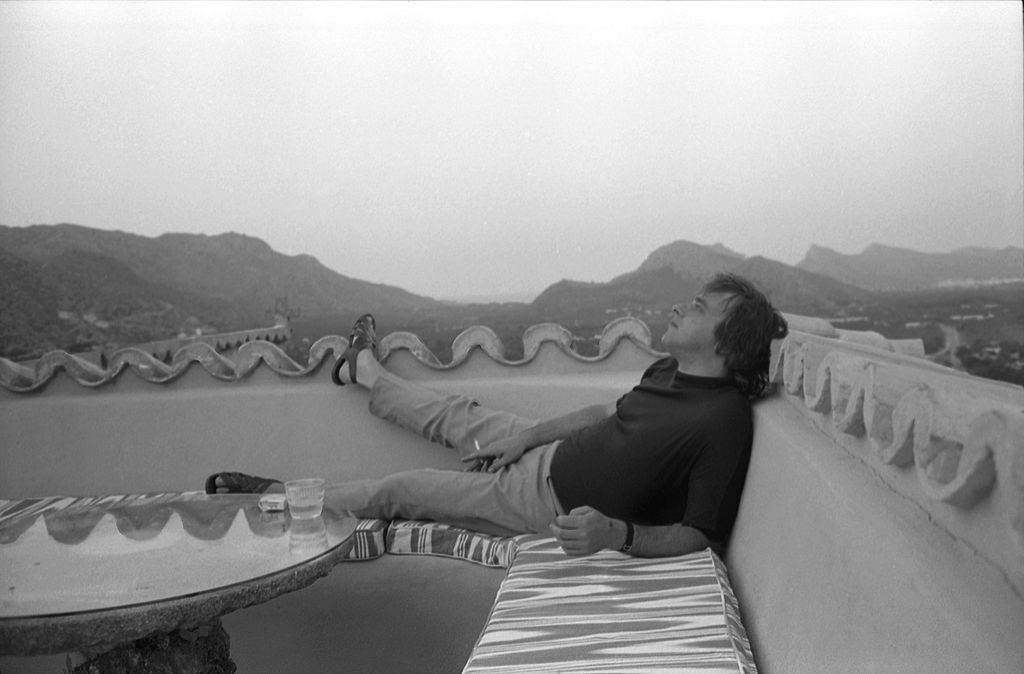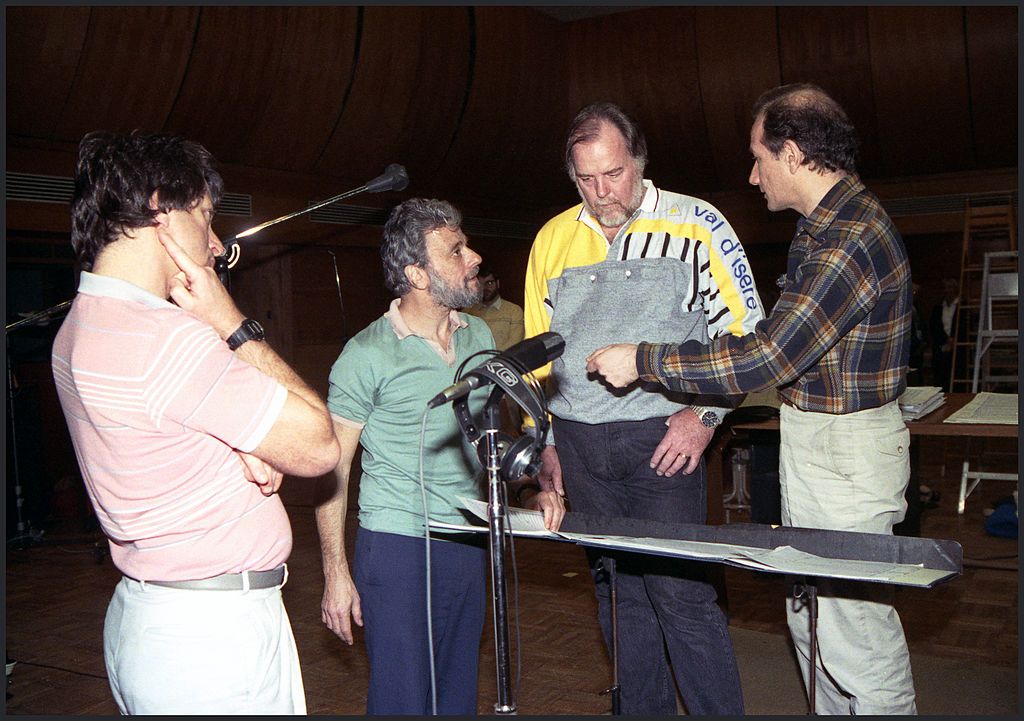A Song All By Himself
Farewell to Stephen Sondheim, the best to ever do it. But from your bookshelf to your music stand to your Netflix queue, he can never truly be gone.

Edited by Spencer Ackerman
THE WHOLE SET SHINES with the same gloss as the Steinway baby grand that sits, unplayed, at its center. Raúl Esparza rests morosely next to a New York apartment radiator as his friends sing-chant his character’s name (“Bobby! Bobby!”) over and over, each playing an abusive tune on their own instrument, until Bobby can’t take it any more. Instead of singing a rejoinder, he screams “STOP!” at the top of his lungs, shocking them into silence. He’s the only one who hasn’t played a single note the whole show. He finally walks over to the piano, as we always knew he would, and begins to accompany himself as he sings the last song in Company, “Being Alive,” its music and lyrics by Stephen Sondheim, who died on Friday at 91.
You can pick on Company, just as you can pick on Sunday in the Park With George or Pacific Overtures or Assassins. But in a good production, we get moments like this one: perfectly timed surprise followed by desperate, ironic songs of uncertainty and imperfection, each as inarguably correct as an equation. Any criticism, no matter how fully justified or insightful, simply ceases to apply in those moments, when all the elements that make up Sondheim’s work—music, poetry, voices—conspire together with him to form the thinnest possible barrier between him and you, through which he invites you to feel something with no name. Or something with a name so long and hard to pronounce that it is a song all by itself.
You’re reading a free post by Sam Thielman on FOREVER WARS, an independent outlet devoted to covering crimes of the state. We can’t make this work without support from our readers, and we want to keep on doing it as long as there are crimes to investigate (hence the title). Please consider signing up for a paid subscription using the button below.
Sondheim recoiled from familiar feelings. His total mastery of his art form gave him permission to write musicals about subjects that seem impossible or dangerous to dramatize. In Assassins, he writes a history of American popular music, each song sung in the period’s style by an assassin or would-be assassin of an American president. Throughout the musical, the assassins sing Sondheim’s vicious restatement of their thesis: “Everybody’s got the right to be happy!”
Not everybody, of course, has the right to be happy, especially if what makes them happy is shooting Abraham Lincoln, and Assassins is one of a few works by Sondheim that attempt to mine the misanthropy and rage called forth by the hard sell of the American dream. “There’s another national anthem playing/ Not the one you cheer/ At the ballpark. ‘Where’s my prize?’” sing John Wilkes Booth, Leon Czolgosz, John Hinckley and Charles J. Guiteau. “It’s the other national anthem, saying/ If you want to hear/ it says ‘Bullshit!’/ It says ‘Never!’/ It says ‘Sorry!’ Loud and clear.” It’s a terrifying moment, up there with the scariest scenes in his delightful cannibal melodrama Sweeney Todd, and along similar lines: “The history of the world, my sweet,” sings Sweeney as he and his partner Mrs. Lovett decide to cook Sweeney’s victims into pies, “is who gets eaten and who gets to eat.” In his best-known works, like his lyrics for West Side Story and Gypsy, his love of experimentation is hemmed in by tradition; as he got older, though, he got gratifyingly, extremely, weird.
Sometimes his themes were more intimate. In A Little Night Music, Sondheim took the bones of a sex comedy and overlaid the bruising laughs with desperately sad songs about love unrequited and love cheated. “A humiliating business,” sighs one betrayed woman in a duet with another.

THE CONVENTIONAL MUSICAL THEATRE MODE is for characters to find themselves so in love, so angry, so overcome with joy or sorrow that to say it aloud simply won’t do: They have to sing and occasionally dance about it. Sondheim’s characters rarely dance, and they don’t sing because speaking isn’t enough; they sing because speaking is impossible. Even his love songs, of which there are many, are complaints, or worse—the cries of people poisoned by love; crippled by it; driven mad by their own obsessions. “I would come take you from your life/ I would come take you from your cell,” sing John Hinckley and Squeaky Fromme, respectively, in Assassins. They harmonize with each other, but might as well be on different planets—all they can think of are the depths to which they hope to be driven by Jodie Foster and Charles Manson. “You would be queen to me, not wife/ I would crawl belly deep through hell,” they croon. It’s a leitmotif that runs through nearly all of Sondheim’s work: Even in love, you are alone.
Or not. At our most lonely, we are also part of the world. “Someone is on your side/ Someone else is not,” sings the cast of Into the Woods. “While we're seeing our side/ Maybe we forgot/ They are not alone/ No one is alone.” It’s a piece of music that literally refuses to resolve: The melody of the phrase “No one is alone” predicts, then misses an E note by a full step until the song’s very, very last bar. Sometimes Sondheim wrote the lyrics themselves this way, too, repeating a single rhyme from stanza to stanza in a way that interrupted his neat couplets—a little thread of repeated anxiety that couldn’t be pushed away and had to be dealt with by the end of the number.
Sondheim, as Isaac Butler points out in Slate, recognized that “ambivalence is actually a state of deep feeling.” Sondheim’s predecessors—Rogers and Hammerstein, Frank Loesser—and his contemporaries, like Andrew Lloyd Webber, began their songs with catharsis. Sondheim ended his with it.

SOME OF SONDHEIM’S DETRACTORS saw him in competition with the artists around him who created the blockbuster musical, like Claude-Michel Schönberg and Alain Boublil (the team behind Les Miserables and Miss Saigon) and Lloyd Webber (Phantom of the Opera, Cats). In financial terms, as Tom Sutcliffe notes in an especially ungenerous obituary, Sondheim was the clear loser. I’ve never been able to find “No One Has Ever Loved Me” from Passion on a karaoke machine. Merrily We Roll Along: The Las Vegas Spectacular seems unlikely. But perhaps there are other systems of value beyond megabucks. Perhaps one of those is that, when I saw the very last performance of Passion, a weird little show based on an Italian indie movie, at the Donmar Warehouse with my wife on our honeymoon, I understood love itself a little better. I understood how different love was from passion, and how much of it, and of everything, was made of small pieces that do not so much knit satisfyingly together as accrue and accumulate weight. It's the ripple, not the sea, that is happening, as he puts it elsewhere.
And, especially as an accumulation of his work, Sondheim himself was anything but small. He was a giant; the kind of titanic artist without whom musical theatre as it is today simply doesn’t exist. He wrote the lyrics to West Side Story and Gypsy, after all. It’s hard to criticize him because in doing so we have the impossible task of teasing out which bits of the form are due to his vast influence.
I’m going to go out on a limb here and say that influence has been largely positive—as the megamusicals have waned, Sondheim has remained more or less constantly in production, and we find ourselves humming his tunes, pondering his lyrics, and noticing the various crummy movies of his shows in the Netflix queue. By the time of his death, he had simply become part of life. I wish he had lived forever, but his absence feels not so much like an inevitability as an absurdity. How can Sondheim be gone? He’s right there, in my headphones or on the bookshelf. It is Sondheim’s stage, we merely strut and fret an hour upon it. It is that hour in which we are alive.

